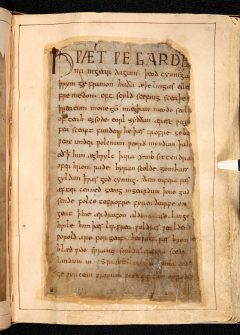
Dr. Matthew Scribner has recently published a book chapter in a scholarly collection of essays titled Darkness, Depression, and Descent in Anglo-Saxon England and edited by Ruth Wehlau (Medieval Institute Publications, 2019). The chapter in question is titled “Signs, Interpretation, and Exclusion in Beowulf” (117-132). Congratulations Dr. Scribner!
https://www.degruyter.com/view/product/533942
https://www.bl.uk/collection-items/beowulf
ABSTRACT:
Poststructuralist thinkers have demonstrated how tenuous the relationship can be between signs and signifiers, but medieval philosophers were also aware of this. Medievalists such as Eric Jager and Eugene Vance have shown how Augustine believed misinterpretation and misunderstanding are endemic as a result of the Fall from Eden. Something of this theory can be found in Beowulf, whether it originates with Augustine or not. The poem presents us with several instances of misunderstanding and non-understanding of signs, most notably Grendel’s rage over the Danes’ happy song, the Danes’ reaction to the Finsburh song, Hrothgar’s ignorance of the Biblical context of the giant’s hilt, and Beowulf’s initial perplexity over what to make of the destruction of his hall. Drawing on these and other examples, I aim to prove that misunderstood signs in the poem come from outsiders and other groups, thereby making exclusion – whether from the tribe or even from Eden – an important concept in the semiotics of the poem. Given this unstable semiotics of the fallen world, I examine Beowulf’s relative success as an interpreter as part of his character as a model secular warrior. Lastly, I apply the semiotics at play within the poem to the poem itself, and discuss how we as interpreters of the poem are always being led astray and thwarted by having our expectations reversed. I hope that this paper will contribute to the argument made by some scholars that any interpretation of Beowulf must remain tentative and open.